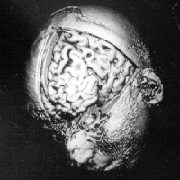
While previous research has shown that there is heightened activity in the prefrontal cortex – the area of the brain that enables most people to feel remorse or learn moral behavior – when normal people lie, this is the first study to provide evidence of structural differences in that area among pathological liars.
The research – led by Yaling Yang and Adrian Raine, both of the USC College of Letters, Arts and Sciences – is published in the October issue of the British Journal of Psychiatry.
The subjects were taken from a sample of 108 volunteers pulled from Los Angeles’ temporary employment pool. A series of psychological tests and interviews placed 12 in the category of people who had a history of repeated lying (11 men, one woman); 16 who exhibited signs of antisocial personality disorder but not pathological lying (15 men, one woman); and 21 who were normal controls (15 men, six women).
“We looked for things like inconsistencies in their stories about occupation, education, crimes and family background,” said Raine, a psychology professor at USC and co-author of the study.
Why not add the category — politician?
“Pathological liars can’t always tell truth from falsehood and contradict themselves in an interview. They are manipulative and they admit they prey on people. They are very brazen in terms of their manner, but very cool when talking about this.”
Aside from having histories of conning others or using aliases, the habitual liars also admitted to malingering, or telling falsehoods to obtain sickness benefits, Raine said.
After they were categorized, the researchers used Magnetic Resonance Imaging to explore structural brain differences between the groups. The liars had significantly more “white matter” and slightly less “gray matter” than those they were measured against, Raine said.
More white matter – the wiring in the brain – may provide liars with the tools necessary to master the complex art of deceit, Raine said.
“Lying takes a lot of effort,” he said.
But in normal people, it’s the gray matter – or the brain cells connected by the white matter – that helps keep the impulse to lie in check.
Pathological liars have a surplus of white matter, the study found, and a deficit of gray matter. That means they have more tools to lie coupled with fewer moral restraints than normal people, Raine said.
The researchers stopped short of asserting that these structural differences account for all lying.
“This is one of the components,” Raine said.
So, uh — when are they going to test Congress?















I would love to see a study done with a larger sample! It would also be interesting to know how upbringing correlates with the way in which the brain is developed.
The USC study finds “structural brain abnormalities in people who habitually lie” which will surely lead to research on some kind of treatment or medication to treat dishonesty. This is like treating depression. I happen to enjoy depression, so I just drink alcoholic beverages.
For some people, an antidepressant is the ticket.
See Politics, Profits and Prozac by Dean W. Manders.
http://www.ceri.com/trypto.htm
What does this imply about anyone who works in advertising or as a car, auto or insurance salesperson?
My theory is that good liars, systematic liars, psychopaths and manipulators, aren’t really human beings. And should therefore be denied any rights to be treated as such!
But hey, I live in a dreamworld…
Test congress? How about a top-down testing instead? Start with W, Dickie, Rice-a-Roni, Dumbsfeld, and on down with the entire administration?
Remember being told as a child that every lie put a black mark on your soul –
wrong – it was white
I think this hole thing about Pathological liars is a great study. However I beleave it also should have a name replacment from my personal opinion. I beleave it should be called Pathological thinking because as far as I’m conserned it is how Pathological liars process information not just lying. I personaly beleave I’m a Pathological liar my self. I do admit to lying consitterablly a lot and aparantly I can not tell when I’m lying in general but if things are truly important to me I will not keep a lie on going I will corect it. also to me it seems there is a hole lot more involved then lying. I totaly agree with the hole thing about the emotions. All my life I have been practuly emotionless even though I do have emotions. However I have lost a job for be far to emotionless. I was told I do not blink my eyes enough, I staired and acted as if i were a robot. Its normal my own family has problems with me being this way. to counteract people problems with me I lye to them constantly and I do not have inconsistancys between my lies. I’m exelent at the lies I creat and they come naturaly. So naturaly I have to corect my self when it comes to me truly wanting to tell the truth. I keep true to them all the way up to the point of telling the truth. People generaly point out I think to far into things or I analize things to far. I would like to see this study go futher and I would desire it to be looked futher into then just lying. Anyone interested in contacting me my E-mail is thedarkbanshee@mail.com